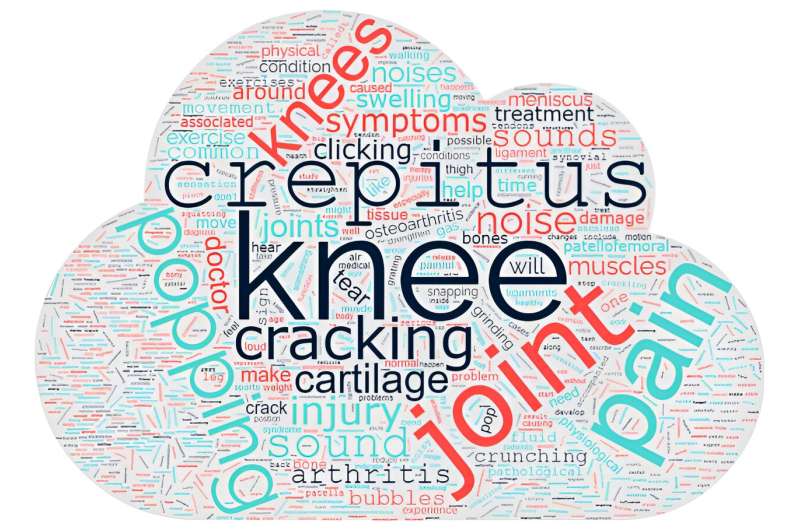This article has been reviewed according to Science X's editorial process and policies. Editors have highlighted the following attributes while ensuring the content's credibility:
fact-checked
trusted source
proofread
Online misinformation about noisy knees is influencing people to make poor health choices

From cracking, clicks and popping sounds, it is estimated knee crepitus affects up to 70% of people.
Lead researcher Dr. Danilo de Oliveira Silva, at the La Trobe Sport and Exercise Medicine Research Center, said despite its prevalence, little is known about knee crepitus and there is a lack of credible information on the web.
"Many people believe these sounds are very bad for their health or are embarrassed and worried, which is causing some to change how they move," Dr. de Oliveira Silva said.
"People's first thought is often: 'let's see what I can find about it on the internet.' So, the web is a common source for obtaining health information."
Dr. de Oliveira Silva, and a team of three other La Trobe researchers, conducted a comprehensive appraisal of two popular search engines where they explored the credibility and accuracy of information available.
The study, now published in JSAMS Plus, sifted through the top 20 URLs of Google and Bing, comprising 51 websites—narrowed down from 120—which were evaluated to determine whether the content was supported by evidence.
Dr. de Oliveira Silva said the results were "quite shocking," with more than half of the websites not supported by evidence.
"Patients and clinicians should take caution when seeking web-based information about knee crepitus," the lead researcher said.
"Many websites suggested treatment options to reduce knee crepitus, including exercise, medication, passive treatments (such as brace, ice and splints) and rest. There is no research evidence to support this information."
"Our research found websites about knee crepitus lack credibility, present a large variation in readability outcomes and are mostly a source of misinformation."
The study provides guidance on what is known about the topic of noisy knees based on research evidence.
Dr. de Oliveira Silva said further clinical studies should be undertaken to explore the role of knee crepitus to people's health, with the inclusion of patients and health professionals when designing the research question.
More information: Fernanda Serighelli et al, "My knee is cracking"—What information is available on the internet about it? A systematic appraisal of the credibility, readability and accuracy of online information about knee crepitus, JSAMS Plus (2023). DOI: 10.1016/j.jsampl.2023.100041




















